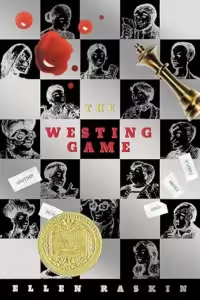The Westing Game
Ellen Raskin
Puffin
Published June 1, 1997 (Orig. 1978)
Amazon | Bookshop | Goodreads
About The Westing Game
A Newbery Medal Winner
“A supersharp mystery…confoundingly clever, and very funny.” —Booklist, starred review
A bizarre chain of events begins when sixteen unlikely people gather for the reading of Samuel W. Westing’s will. And though no one knows why the eccentric, game-loving millionaire has chosen a virtual stranger—and a possible murderer—to inherit his vast fortune, one thing’s for sure: Sam Westing may be dead…but that won’t stop him from playing one last game!
Winner of the Newbery Medal
Winner of the Boston Globe/Horn Book Award
An ALA Notable Book
“Great fun for those who enjoy illusion, word play, or sleight of hand.” —The New York Times Book Review
“A fascinating medley of word games, disguises, multiple aliases, and subterfuges—a demanding but rewarding book.” —The Horn Book
My Review
I’ve seen this book on must-read YA lists for a long time, so when I spotted it recently on a sale table at a bookstore, I decided to pick up a copy.
It seems like a convention-setting story. As I read the book, it reframed some of my thoughts about similar stories published more recently. It didn’t detract from anything, but maybe just gave me more context in the genre of game mysteries in the young adult market.
Since it was originally written in 1978, the story contains some of the dated language that we’ve since acknowledged is harmful, particularly to Chinese Americans and disabled people. There are also some references to a character who died by suicide before the story begins that reflect the understanding of mental health more typical of the time the story takes place.
The Westing Game also has a lot of named characters. It involves sixteen people and a few peripheral characters. They’re introduced rapidly at the beginning of the story, as the setup for the game begins almost immediately. I tend to struggle with books that have a ton of named characters, especially when they’re introduced all at once, so this definitely posed a challenge for me.
The narrative moves from an omniscient perspective to a close third-person point of view, highlighting different characters’ motives, thoughts, and responses to various events in the text. The author does a great job differentiating one character’s voice from another, which helped me keep the characters straight once I got deeper into the story.
I liked the mechanism of partners and clues within each round. I also liked getting to see how each team approached the game, who was messing with the other players behind the scenes, and why. There was a lot going on, and the pieces all fit together nicely. It reminded me a little bit of the show Who Is the Mole? on Netflix, but with an added mystery to solve.
Content Notes for The Westing Game
Recommended for Ages 12 up.
Representation
The Hoo family is Chinese. One character is a wheelchair user with an unspecified disability. Another pretends to need crutches for attention.
Profanity/Crude Language Content
One character uses words and language condemned as bigoted by another character. (It is.) Some ableist descriptions of the boy who uses a wheelchair. Some racist descriptions of or references to the Chinese family. There are also some harmful stereotypes repeated within the text.
Romance/Sexual Content
References to marriage.
Spiritual Content
None.
Violent Content
Several references to a character who died by suicide. A child encounters a lifeless body.
Drug Content
A married couple goes to a cafe and returns drunk.
Note: This post contains affiliate links, which do not cost you anything to use but help support this blog. All opinions are my own.


















My own personal children loved this one (I think a teacher read it to their classes), but it never did much for me, even though I have found memories of The Mysterious Disappearance of Leon (I Mean Noel). It leaves the shelves every couple of years, but I should probably think about weeding it. Guess it depends on the condition of the copy!
Nice! Yeah, whether to weed it sounds like a hard choice. I’m glad a few students are still discovering the story. 🙂